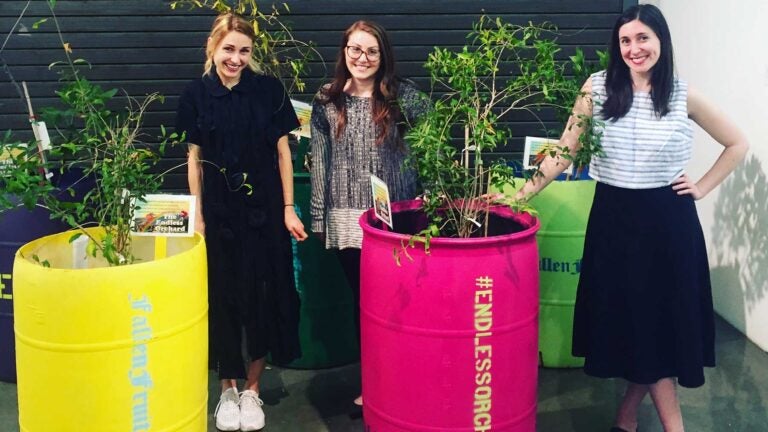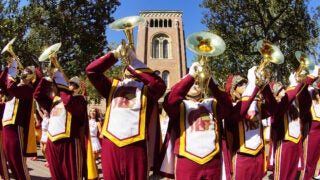
Dirty Talk curators Carly Warhaft, Karen Hinchcliffe and Rachel Keller, from left (USC Photo/Stephanie Weiss)
USC Roski exhibition leaves visitors thinking about trees, ecology
Soil regeneration and green space are at the heart of Dirty Talk.
Before leading a tour of the exhibition Dirty Talk, USC Roski School of Art and Design MA student Rachel Keller takes a broom in hand, sweeping up the soil and fallen leaves that have escaped the artworks.
The fruit trees of “The Endless Orchard” recently were moved indoors to the gallery space, she said, and so far they appear to be tolerating the stress, leaves gleaming green as they sit nestled in their brightly colored 50-gallon barrels.
Elsewhere in the exhibition, there are hand-drawn maps marking where each species of tree has historically grown in the neighborhoods of Los Angeles and where, perhaps, fruit trees might flourish again.
“The goal,” co-curator Karen Hinchcliffe said, “is to create an app and then people will have access to maps charting where these trees have grown and are growing, and if you plant one, you can add it to the map.”
That’s just one component of Dirty Talk, which explores art that promotes engagement on local ecological issues, particularly soil regeneration and green space.
The exhibition culminates three semesters of work for USC Roski master’s students. Seven second-year students worked to create three exhibitions and initiatives that explore contemporary issues including ecology, use of public space and the intersection of technology with sexuality. It is the culmination of the master’s program, giving students the opportunity to apply critical and curatorial theory and deep knowledge of art history they have accumulated throughout the curriculum.
Though the exhibitions have wrapped up as the semester comes to a close, it’s not the end for the graduate students: The material in these projects will guide their masters’ theses, as well as further scholarship.
“A lot of these projects deal with a sense of helplessness in the face of unknowable global issues,” Keller said, “as well as how we can take some sort of action to educate ourselves and reveal these larger processes and help to alleviate them.”



